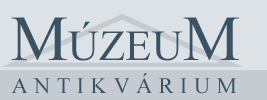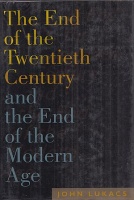kategóriák
- Közlekedés ajánlójegyzék
- Szocreál ajánlójegyzék
- Reklám ajánlójegyzék
- Fotó ajánlójegyzék
- Kínai-japán ajánlójegyzék
- Szentkép ajánlójegyzék
Új árakkal! - Új szentkép ajánlójegyzék II.
- 12 érdekes régiség
 Könyv
Könyv
 Bibliofilia
Bibliofilia
 Régiség
Régiség
 Metszet
Metszet
 Térkép
Térkép
 Fotó
Fotó
 Papírrégiség, Aprónyomtatvány
Papírrégiség, Aprónyomtatvány
 Plakát
Plakát
- Cirkusz
- Modern grafika
- Szocreál
- NER Irodalom
- Egyéb
kosár
üres a kosár
nincs bejelentkezve
Lukacs, John R. : The End of the Twentieth Century - and the End of the Modern Age
- leírás
- további adatok
Historian John Lukacs's brilliant new book offers a provocative summing-up of the twentieth century, that age of iron which began with the guns of August in 1914 and ended with the collapse of the Soviet Union in 1989. Distinguished by its author's masterly style and command of detail, The End of the Twentieth Century is a startling examination of where we are today, how we got here, and where we are headed.
Centering on Europe, America, and the relations between the two, Lukacs argues that the major battle of our time has been waged between forms of nationalism rather than between communism and democracy; that the great watershed events have been the two world wars, not the Russian Revolution; and that the century's radical revolutionary was neither Lenin nor Chairman Mao but Adolf Hitler. The book puts into sharp perspective such events as the collapse of the Soviet Union, the civil war raging in what was Yugoslavia, and the resurgence of right-wing politics in a reunited Germany. Rather than the end of history, we are now witnessing the end of the modern era, and what awaits us is not the triumphal reign of liberal democracy but a troubled time that may echo much that is most questionable in our age.
Informed by the precision and insight that have made Lukacs a leading historian, The End of the Twentieth Century is a reckoning both personal and professional - at once a brilliant rebuttal to Francis Fukuyama's The End of History and an outstanding, if sobering, work of historical mediation.
Centering on Europe, America, and the relations between the two, Lukacs argues that the major battle of our time has been waged between forms of nationalism rather than between communism and democracy; that the great watershed events have been the two world wars, not the Russian Revolution; and that the century's radical revolutionary was neither Lenin nor Chairman Mao but Adolf Hitler. The book puts into sharp perspective such events as the collapse of the Soviet Union, the civil war raging in what was Yugoslavia, and the resurgence of right-wing politics in a reunited Germany. Rather than the end of history, we are now witnessing the end of the modern era, and what awaits us is not the triumphal reign of liberal democracy but a troubled time that may echo much that is most questionable in our age.
Informed by the precision and insight that have made Lukacs a leading historian, The End of the Twentieth Century is a reckoning both personal and professional - at once a brilliant rebuttal to Francis Fukuyama's The End of History and an outstanding, if sobering, work of historical mediation.
| állapot: |     |
| kategória: | Könyv > Idegennyelvű könyvek > Angol nyelvű > |
| kategória: | Könyv > Történelem > XX. század, politika > |
| kiadó: | Ticknor & Fields, 1993. New York, |
| cikkszám / ISBN: | 9780395584729 |
| kötés: | kötve/félvászon (kiadói, eredeti védőborítóban) |
| oldalszám: | 291 |
| könyv nyelve: | angol |









 Telefon:
Telefon: E-mail:
E-mail:







